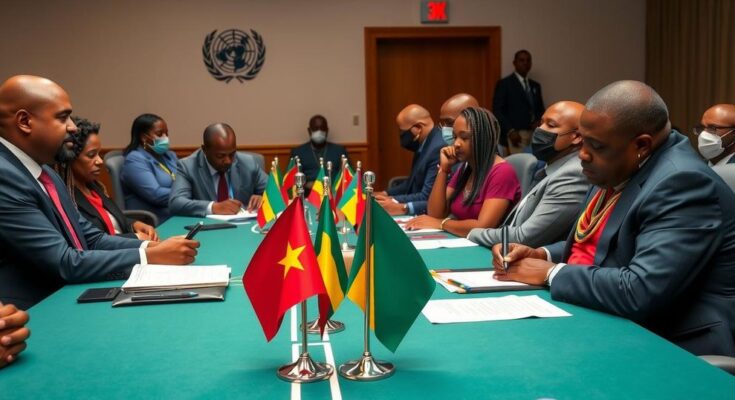The African Union urged Ethiopia and Somalia to swiftly implement an agreement aimed at resolving tensions over Ethiopia’s access to the sea. The agreement follows a contentious deal between Ethiopia and Somaliland and aims to foster cooperation while respecting sovereignty. Technical talks are scheduled as part of the agreement, with significant emphasis on mutual interests and peace in the region.
On Thursday, the African Union called upon Ethiopia and Somalia to promptly enact an agreement that aims to resolve escalating tensions between the two nations regarding Ethiopia’s access to the sea. The African Union characterized this agreement as a significant development. Tensions arose after Ethiopia established a deal with Somaliland, a breakaway region from Somalia, in January to lease coastal territory for a port and military use. Somaliland, which declared independence from Somalia in 1991—a status not recognized by Mogadishu—hoped to gain formal recognition from Ethiopia in exchange for the deal. Somalia condemned the agreement as a breach of its sovereignty, raising concerns over the potential for renewed conflict in the region.
Following extensive discussions mediated by Turkey, an agreement emerged that Ethiopian Prime Minister Abiy Ahmed and Somali President Hassan Sheikh Mohamud regarded as a pivotal moment. President Erdogan of Turkey asserted that this accord would grant Ethiopia the long-awaited access to maritime routes. As a vital next step, the parties are set to engage in technical discussions in the coming year. President Mohamud highlighted the necessity for cooperation to bolster regional peace and stability.
Chairman of the African Union Commission, Moussa Faki Mahamat, acknowledged the significance of the leaders’ commitment to dialogue while stressing the urgency in implementing the agreed measures. Meanwhile, the Intergovernmental Authority on Development (IGAD) commended the agreement as a significant stride toward fostering amicable resolutions of disputes.
The accord, as reported by Turkey, includes a commitment by both nations to collaboratively move past their differences as they seek common prosperity. They will work on commercial arrangements and agreements that will secure Ethiopia’s “reliable, safe and sustainable access” to the sea, all while respecting the sovereignty of Somalia. The agreement outlines a timeline for technical discussions and proposes resolution of any disagreements through dialogue, potentially with Turkish mediation. High-ranking officials from both the United States and the United Nations expressed optimism regarding the negotiations and the implications of the accord, asserting the importance of each nation’s sovereignty and integrity.
The relationship between Ethiopia and Somalia has been historically fraught with tensions, particularly following Ethiopia’s landlocked status after Eritrea’s independence in 1993. Somalia’s concerns center around the legitimacy of agreements made by the breakaway region of Somaliland, which affects overall regional dynamics. The recent deal between Ethiopia and Somaliland has escalated these tensions, leading to international concern over the potential for conflict. The African Union’s intervention suggests a commitment to diplomatic solutions and the importance of regional cooperation, particularly in light of recent talks facilitated by Turkey.
The African Union’s appeal for Ethiopia and Somalia to expeditiously implement their recent agreement underscores the growing urgency to stabilize relations between the two countries. As both nations strive for cooperative solutions, the international community watches closely, hoping this initiative will avert further escalations. The emphasis on respecting sovereignty and mutual interests indicates a potential shift towards a more collaborative regional stance, marking an essential step in maintaining peace in East Africa.
Original Source: www.enca.com




